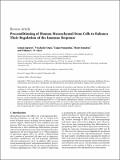Preconditioning of Human Mesenchymal Stem Cells to Enhance Their Regulation of the Immune Response
Author(s)
Saparov, Arman; Ogay, Vyacheslav; Nurgozhin, Talgat; Jumabay, Medet; Chen, William C. W.
DownloadSCI.2016.3924858.pdf (526.8Kb)
PUBLISHER_CC
Publisher with Creative Commons License
Creative Commons Attribution
Terms of use
Metadata
Show full item recordAbstract
Mesenchymal stem cells (MSCs) have attracted the attention of researchers and clinicians for their ability to differentiate into a number of cell types, participate in tissue regeneration, and repair the damaged tissues by producing various growth factors and cytokines, as well as their unique immunoprivilege in alloreactive hosts. The immunomodulatory functions of exogenous MSCs have been widely investigated in immune-mediated inflammatory diseases and transplantation research. However, a harsh environment at the site of tissue injury/inflammation with insufficient oxygen supply, abundance of reactive oxygen species, and presence of other harmful molecules that damage the adoptively transferred cells collectively lead to low survival and engraftment of the transferred cells. Preconditioning of MSCs ex vivo by hypoxia, inflammatory stimulus, or other factors/conditions prior to their use in therapy is an adaptive strategy that prepares MSCs to survive in the harsh environment and to enhance their regulatory function of the local immune responses. This review focuses on a number of approaches in preconditioning human MSCs with the goal of augmenting their capacity to regulate both innate and adaptive immune responses.
Date issued
2016-10Department
Massachusetts Institute of Technology. Department of Biological Engineering; Massachusetts Institute of Technology. Research Laboratory of ElectronicsJournal
Stem Cells International
Publisher
Hindawi Publishing Corporation
Citation
Saparov, Arman; Ogay, Vyacheslav; Nurgozhin, Talgat; Jumabay, Medet and Chen, William C. W. "Preconditioning of Human Mesenchymal Stem Cells to Enhance Their Regulation of the Immune Response." Stem Cells International
Volume 2016, 3924858 (October 2016): 1-10 © 2016 Arman Saparov et al
Version: Final published version
ISSN
1687-966X
1687-9678